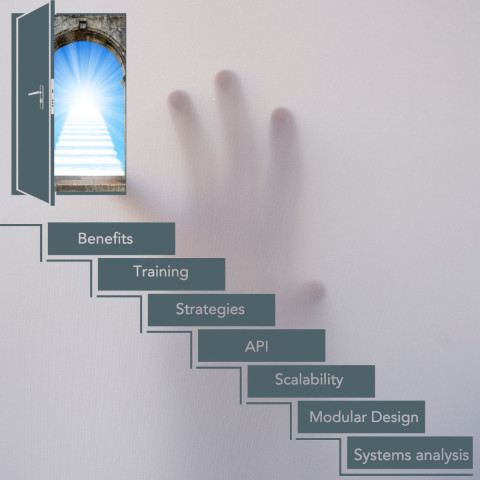Advantages and Disadvantages of Bespoke Software
In today's fast-paced and dynamic business landscape, organisations are constantly seeking ways to gain a competitive edge, enhance efficiency, and adapt to evolving market demands. One powerful tool that empowers businesses to achieve these objectives is Bespoke software solutions. Unlike off-the-shelf software packages that offer generic solutions, Bespoke software is custom-built to meet the specific needs and requirements of a business.
1.Tailored Precision for Enhanced Efficiency
One of the most significant advantages of Bespoke software is its ability to align perfectly with the unique workflows, processes, and objectives of a business. Off-the-shelf software often comes with unnecessary features and complexities that can hinder productivity. Bespoke applications, on the other hand, eliminates these inefficiencies by focusing solely on the functionalities that matter most to the business. By streamlining operations and reducing manual workarounds, Bespoke software enhances efficiency and productivity, enabling businesses to accomplish more in less time.
2.Customisation and Adaptability
Bespoke software offers unparalleled customisation and adaptability, allowing businesses to tailor the software to their exact specifications and adapt it to changing needs and market conditions. Whether it's adding new features, integrating with existing systems, or scaling up to accommodate growth, Bespoke software can be modified and extended to meet evolving requirements. This flexibility empowers businesses to stay agile and responsive in a rapidly changing business environment, giving them a competitive edge over rivals who rely on rigid off-the-shelf software.
3.Ownership of Intellectual Property and Control
When businesses invest in Bespoke software development, they retain full ownership of the intellectual property rights associated with the software. This means they have complete control over the development roadmap, prioritisation of features, and future enhancements. Unlike off-the-shelf software, where businesses are beholden to the terms and conditions of third-party vendors, Bespoke software gives businesses the autonomy to dictate the direction and evolution of their software solutions, ensuring alignment with strategic objectives and business priorities.
4.Seamless Integration with Existing Systems
Software system integration and infrastructure is a crucial aspect of software implementation for businesses. Customised software solutions can be seamlessly integrated with a wide range of third-party applications, databases, and platforms, ensuring smooth data exchange and interoperability. Whether it's connecting with CRM systems, ERP solutions, accounting software, or IoT devices, Bespoke business software can be tailored to facilitate seamless integration, enabling businesses to leverage their existing technology investments and maximise efficiency.
5.Competitive Advantage through Differentiation
In today's competitive marketplace, differentiation is key to standing out and capturing market share. Bespoke application software enables businesses to differentiate themselves by offering unique features, functionalities, and user experiences that resonate with their target audience. By understanding the specific needs and preferences of their customers, businesses can leverage custom made software to deliver personalised solutions that set them apart from competitors and create a compelling value proposition.
6.Enhanced Data Security and Compliance
Data security and compliance are top priorities for businesses across all industries. Custom business software solutions can be designed with robust security measures and compliance standards in mind, ensuring that sensitive data is protected from unauthorised access, breaches, or cyber threats. By adhering to industry best practices and regulatory requirements, Bespoke software helps businesses maintain trust and credibility with customers, partners, and stakeholders, mitigating risks and safeguarding reputation.
7.Long-term Cost Efficiency and Return on Investment (ROI)
While the initial investment in Bespoke software development may be higher compared to purchasing off-the-shelf solutions, the long-term cost savings and return on investment (ROI) can be substantial. A Bespoke application eliminates recurring licensing fees, subscription costs, and the need for costly customisations or workarounds associated with off-the-shelf software. Moreover, the efficiency gains, productivity improvements, competitive advantages and reduction in resources enabled by Bespoke software contribute to significant cost savings and revenue growth over time, delivering a compelling ROI for businesses.
DID YOU KNOW
Custom software development can reduce operational costs by 30%, increase revenue by 20%, and improve customer satisfaction by 40%. (Stratoflow.com)
8.Dedicated Support and Maintenance
With custom business software, companies have access to dedicated support and maintenance services tailored to their needs. Whether it's troubleshooting technical issues, providing updates, or offering enhancements, businesses can rely on their development partners to provide timely assistance and ensure the continued reliability and performance of their Bespoke software solutions. This proactive approach to support and maintenance helps businesses minimise downtime, maximise uptime, and optimise the overall user experience, driving customer satisfaction and loyalty.
Disadvantages and Challenges
1.Time and Resource Intensive
Bespoke software development requires careful planning, extensive requirements gathering, and iterative development processes. It can be time-consuming and resource-intensive, particularly in the initial stages of the project, as developers work closely with clients to understand their needs and preferences.
2.Expertise and Skill Set
Building Bespoke software requires specialised expertise and a diverse skill set encompassing software development, UI/UX design, project management, and quality assurance. Organisations may need to invest in training or engage external partners with the necessary skills to execute the project successfully.
3.Stakeholder Alignment
Achieving consensus among stakeholders regarding the scope, features, and priorities of the Bespoke software can be challenging. Effective communication, collaboration, and stakeholder engagement are essential to ensure that the final product meets expectations and delivers value to all stakeholders.
4.Maintenance and Support
Once the Bespoke application is deployed, ongoing maintenance, support, and updates are crucial to ensure its continued effectiveness and relevance. Organisations must have the infrastructure and expertise to address any issues or enhancements that arise over time.
5.Risk of Over-customisation:
There is a risk of over-customisation or feature creep when developing custom business software. Introducing unnecessary complexities or functionalities can lead to increased development costs, longer timeframes, and challenges in maintenance and usability.
Considerations for Bespoke Software Development
1.Comprehensive Requirements Analysis
Thoroughly understanding and documenting the client's requirements is essential for the success of Bespoke business software projects. Clear communication, collaboration, and feedback loops are critical to ensure that the final product meets the client's expectations and business objectives.
2.Agile Development Methodologies
Agile methodologies, such as Scrum or Kanban, are well-suited for Bespoke software development projects. Iterative development cycles allow for flexibility, adaptability, and continuous improvement throughout the development process, ensuring that the final product aligns with evolving requirements and market dynamics.
3.Quality Assurance and Testing
Rigorous software test services and quality assurance processes are essential to identify and address any bugs, errors, or inconsistencies in the Bespoke software. Comprehensive testing strategies, including unit testing, integration testing, and user acceptance testing, help ensure the reliability, performance, and usability of the final product.
4.Scalability and Future-proofing
Building scalable and future-proof Bespoke application software requires careful consideration of scalability, extensibility, and technology trends. Architectural decisions, coding standards, and technology stack choices should support long-term growth and evolution, allowing the software to adapt to changing business needs and technological advancements.
5.Collaboration with Experienced Partners
Engaging with an experienced software development company or consultants can enhance the success of Bespoke software projects. Partnering with firms that have a proven track record, domain expertise, and a collaborative approach can provide valuable insights, guidance, and support throughout the development lifecycle.

Our in-house developed Bespoke software solutions offer unparalleled advantages in terms of customisation, control, integration, and long-term cost efficiency.
Consideration must be given to the challenges related to time, resources, expertise, stakeholder alignment, and risk management.
By carefully considering these factors and adopting best practices in requirements analysis, agile development, quality assurance, and collaboration, organisations can leverage Bespoke software to drive innovation, efficiency, and competitive advantage in today's dynamic business landscape, overall, a long-term solution for a fore-sighted business.

Admin Overload: The Silent Business Killer
The cost of manual, repetitive admin tasks In countless small and medium-s...
3 min read

eCommerce Trends 2025
The e-commerce landscape has been evolving at a rapid pace over the past fe...
5 min read

Shopify alternatives A comprehensive guide 2025
In the realm of e-commerce, Shopify has been a dominant player for years, r...
6 min read


